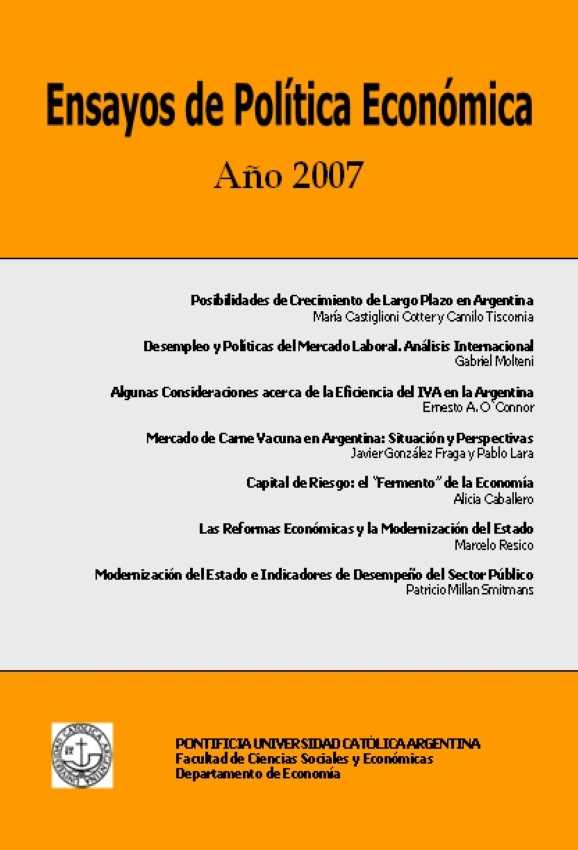Desempleo y Políticas del Mercado Laboral. Análisis Internacional de Políticas Públicas: Algunos Casos Exitosos
Palabras clave:
Mercado laboral, políticas de empleo, seguridad social, flexibilidad laboralResumen
En los últimos quince años, mientras la mayoría de los países del mundo sufrieron un aumento
o estabilidad en el nivel de desempleo, algunos países han logrado mejorar significativamente su situación. Este trabajo lleva a cabo una revisión de la literatura con respecto a las políticas de empleo y del mercado laboral de esos países con el objetivo de extraer algunas lecciones de estas ‘buenas prácticas’. Cabe aclarar que el objetivo no consiste en recomendar políticas específicas para Argentina sino simplemente destacar la relevancia de algunas características comunes que presentan estos casos exitosos.
Los países exitosos, además de experimentar una buena performance en términos de crecimiento económico, implementaron un conjunto de políticas que van desde políticas del mercado laboral activas a un amplio sistema de seguridad social, mayor flexibilidad laboral y políticas salariales moderadas.
Descargas
Referencias
Agell, J. (1999). “On the Benefits from Rigid Labour Markets: Norms, Market Failures and Social Insurance”, Economic Journal, 109.
Auer, P. (2000). “Employment Revival in Europe: Labour Market Success in Austria, Denmark, Ireland and the Netherlands”, Geneva, ILO.
Auer, P. (ed) (2001). “Changing Labour Markets in Europe: The Role of Institutions and Policies”, Geneva, ILO.
Betcherman, G., Dar, A., Luinstra A. and Ogawa, M. (2000). “Active Labour Market Programs: Policy Issues for East Asia”, Social Protection Discussion Paper Series No 5, World Bank.
Betcherman, G., Olivas, K. and Dar, A. (2004). “Impacts of Active Labour Market Programs: New Evidence from Evaluations with Particular Attention to Developing and Transition Countries”, Social Protection Discussion Paper Series No 402, World Bank.
Bosch, G. (2001). “Working Time: From Redistribution to Modernisation”, in P. Auer (ed.), Changing Labour Markets in Europe: The Role of Institutions and Policies, Geneva, ILO.
Drobnic, S. (1997). “Employment Policies and Programmes in Slovenia”, in M. Godfrey and P. Richards (eds), Employment Policies and Programmes in Central and Eastern Europe, Geneva, ILO.
European Commission (2002). “Assessment of the European Employment Strategy - Spain: Final Report”, www.europa.eu.int/comm/employment_social/employment_strategy/eval/eval_es.pdf
Evans-Klock, C., Kelly, P., Richards, P. and Vargha, C. (1998). “Worker Displacement: Public Policy and Labour Management Initiatives in Selected OECD Countries”, Employmen and Training Papers 24, Geneva, ILO.
Federal Department of Employment and Workplace Relations (Australia) (2002). “Youth Employment Policies of the Australian Government Relevant to ILO Member Countries in the Asia and Pacific”, paper prepared for the ILO. See also www.workplace.gov.au
Fretwell, D., Benus, J. and O’Leary, C. (1999). “Evaluating the Impact of Active Labour Market Programs Results of Cross Country Studies in Europe and Asia”, Social Protection Discussion Paper Series No 9915, World Bank.
ILO (1998a). “Youth and Employment”, World Conference of Ministers Responsible for Youth, Lisbon, Portugal.
ILO (1998b). “Skills in Asia and the Pacific: Why Training Matters”, Tripartite Asian and Pacific Consultative Meeting on Human Resources Development and Training, Singapore.
ILO (1999). “Towards Gender Equality in the World of Work in Asia and the Pacific”, Fourth World Conference on Women, Manila.
Kantor, P. (2001). “Promoting Women’s Entrepreneurship Development based on Good Practice Programmes: Some Experiences from the North and South”, SEED Working Paper N 9, Geneva, ILO.
Madsen, P. K. (2003). “Flexicurity through Labour Market Policies and Institutions in Denmark”, in P. Auer and S. Cazes (eds), Employment Stability in an Age of Flexibility: Evidence from Industrialised Countries, Geneva, ILO.
Majeres, J. (2003). “Employment-Intensive Investment and Poverty Reduction: The Wider policy Framework”, ASIST, Bulletin No 15.
Martin, J. (2000). “What Works among Active Labour Market Policies: Evidence from OECD Countries’ Experiences”, OECD Economic Studies, No 30.
Morris, E. (2002). “Policies and Measures of Foreign Countries: Practices from Asia and the Pacific”, Bangkok, ILO.
Nesporova, A. and Uldrichova, V. (1997). “Employment Poliices and Programmes in the Czech Republic”, in M. Godfrey and P. Richards (eds), Employment Policies and Programmes in Central and Eastern Europe, Geneva, ILO.
Rasiah, R. (2002). “Manufactured exports, employment, skills and wages in Malaysia”, Employment Paper 2002/35, Geneva, ILO.
Sirovatka, T., Pribyl, M., Pruza, Z., Rusnok, J. and Vintrova, R. (1999). “Employment and Labour Market Policies in the Czech Republic”, ILO country report.
Visser, J. (2001). “Industrial Relations and Social Dialogue”, in P. Auer (ed.), Changing Labour Markets in Europe: The Role of Institutions and Policies, Geneva, ILO.
Yoo, Kil-Sang (1999). “The Employment Insurance System in Korea”, Seoul, Korea Labour Institute.
Descargas
Publicado
Número
Sección
Licencia
